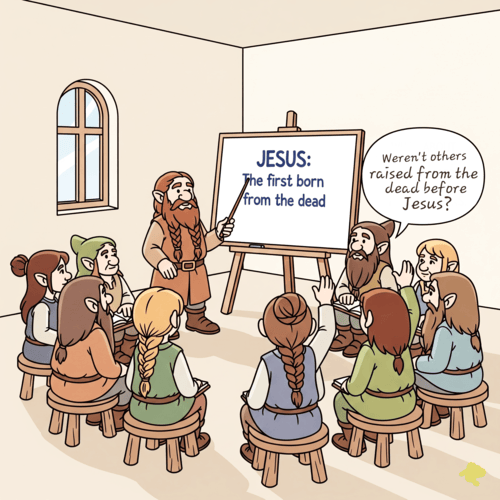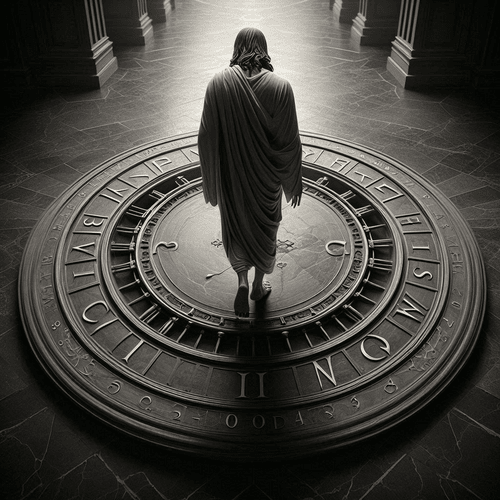“Firstborn from the Dead”: Wasn’t Lazarus Raised Before Jesus?
Here’s a question that has often puzzled Bible readers: If Lazarus was raised from the dead before Jesus (John 11), and so were Jairus’ daughter (Mark 5:41-42) and the widow of Nain’s son (Luke 7:11-17), why does Scripture uniquely call Jesus “the firstborn from the dead” (Colossians 1:18, Revelation 1:5)?
This isn’t a Bible contradiction or even chronological confusion. It’s theological precision that reveals something profound about Christ’s victory over death—and why His resurrection is fundamentally different from every other raising recorded in Scripture.
THE GREEK REVEALS GOD’S INTENT
The key lies in understanding what Scripture actually means by “firstborn.” The Greek word prototokos doesn’t primarily mean “first in time” but “first in rank” or “preeminent.” This isn’t unusual biblical language—it follows a pattern we see throughout Scripture.
Consider Psalm 89:27, where God promises to make David “the firstborn, the highest of the kings of the earth.” David wasn’t chronologically the first king of Israel (that was Saul), but God was establishing David’s supremacy and pre-eminence among all kings. Similarly, when Scripture calls Jesus “firstborn from the dead,” it’s declaring His supreme authority over death itself, not making a timeline claim.
This distinction matters enormously. God’s sovereign ordering of salvation history prioritises significance over sequence. The title “firstborn from the dead” speaks to Christ’s unique role and supreme position, not to mere temporal priority.
TWO KINDS OF “RISING”: THE CRUCIAL DISTINCTION
Here’s where Reformed theology offers crystal-clear insight: there’s a fundamental difference between resuscitation and resurrection. Lazarus experienced the former; Jesus accomplished the latter.
When Lazarus emerged from the tomb, he was still wrapped in grave clothes (John 11:43-44). He returned to the same mortal life he’d left behind—he would grow old, get sick, die again. His sisters would eventually bury him a second time. The same was true for Jairus’ daughter and the widow’s son. They were restored to their previous mortal existence.
Jesus’ resurrection was categorically different. He didn’t simply return to His previous life—He pioneered an entirely new kind of existence. Paul makes this clear in Romans 6:9: “We know that Christ, being raised from the dead, will never die again; death no longer has dominion over him.” Christ rose to immortal, glorified life, with what Paul calls a “body of glory” (Philippians 3:21).
The others were given back their old life. Jesus created new life—an eternal, imperishable, glorified life that death cannot touch.
JESUS: THE PATTERN AND PIONEER
This is why Paul calls Christ “the firstfruits of those who have fallen asleep” (1 Corinthians 15:20). In ancient Israel, the firstfruits were the initial portion of the harvest that guaranteed the full crop to come. Christ’s resurrection isn’t just the first of many—it’s the prototype that guarantees what’s coming for all believers.
Reformed theology emphasises Christ’s resurrection serves as the archetype for our future resurrection. When Lazarus was raised, he provided no pattern for others to follow—he simply got his old life back. But when Jesus rose, he blazed a trail into glorified existence that every believer will one day follow.
Paul explains this beautifully in 1 Corinthians 15:42-49, contrasting our current “natural body” with the coming “spiritual body.” Just as we’ve borne the image of Adam (mortality, corruption, weakness), we’ll bear the image of Christ (immortality, incorruption, power). Romans 8:29 promises we’ll be “conformed to the image of his Son,” and 1 John 3:2 assures us that “when he appears we shall be like him.”
Lazarus couldn’t offer this hope. His raising was wonderful but temporary. Jesus didn’t just reverse death—he transformed it, opening the way for glorified resurrection life for all who believe.
THE FULL WEIGHT OF THE TITLE
When we read “firstborn from the dead” in its biblical contexts, the full theological weight becomes clear. In Revelation 1:5, the title appears alongside “the ruler of kings on earth,” emphasising Christ’s cosmic authority. In Colossians 1:18, it’s explicitly connected to His supremacy “in all things.”
The Reformed tradition recognises that “firstborn from the dead” encompasses Christ’s:
- Complete victory over death’s power
- Absolute authority over death’s domain
- Role as forerunner and guarantee for believers
- Pre-eminence in the new creation order
This isn’t about timing—it’s about theological significance and salvific priority. Jesus alone conquered death permanently. Jesus alone rose to imperishable life. Jesus alone opened the way for others to follow in glorified resurrection.
THE HOPE THIS GIVES US
Jesus holds the title “firstborn from the dead” not because He was chronologically first, but because His resurrection alone conquered death permanently and established the pattern for eternal life. Unlike Lazarus, who returned to mortality, Christ pioneered immortality.
For believers, this means our resurrection won’t be like Lazarus’ temporary return to mortal life. It will be like Jesus’—a transformation into glorified, eternal existence. We have this hope because Jesus didn’t just come back from the dead; he conquered death itself and blazed the trail into resurrection life that we’ll one day follow.
That’s why He alone deserves the title “firstborn from the dead”. It’s not a matter of chronology, but rather—a declaration of His unique, supreme, eternally consequential victory over the grave.
FIRSTBORN FROM THE DEAD: RELATED FAQs
What about Old Testament characters raised by prophets like Elijah and Elisha? The widow’s son (1 Kings 17:17-24) and the Shunammite woman’s son (2 Kings 4:18-37) were also resuscitated, not resurrected. Like Lazarus, they returned to mortal life and would die again. These miraculous restorations pointed forward to Christ’s ultimate victory over death but didn’t establish the pattern for eternal resurrection life that Jesus would pioneer.
- How do modern Reformed scholars view the “firstborn from the dead” title? Reformed theologians like Matthew Henry emphasise Christ “has given us evidence of our resurrection from the dead” through his unique resurrection. Scholars consistently distinguish between temporary restorations and Christ’s permanent conquest of death, viewing the title as declaring his pre-eminence and his role as the prototype for believers’ future glorified bodies.
- Does “firstborn from the dead” relate to Jesus being “firstborn of all creation” (Col. 1:15)? Yes, both titles emphasise Christ’s supremacy and pre-eminence rather than chronological priority. Just as “firstborn of all creation” doesn’t mean Jesus was created first but declares His authority over creation, “firstborn from the dead” establishes his supreme authority over death and resurrection. The parallel structure in Colossians 1 reinforces Christ’s cosmic lordship.
Why doesn’t Scripture mention what happened to people like Lazarus after their raising? Scripture focuses on the immediate purpose of these miracles—demonstrating God’s power and pointing to Christ’s coming victory over death. The ultimate fate of those raised (whether they died again naturally) isn’t theologically crucial since their raisings were temporary signs, not permanent conquests of death like Christ’s resurrection.
- How does the “firstfruits” metaphor relate to “firstborn from the dead”? Both terms emphasise Christ’s role as the guarantee and pattern for believers’ resurrection. “Firstfruits” (1 Cor. 15:20) speaks to the certainty that the full harvest (our resurrection) will follow, while “firstborn from the dead” emphasizes his pre-eminence and pioneering role. Together, they assure us Christ’s resurrection guarantees and defines what ours will be like.
- Did Jesus’s resurrection body have the same physical properties as before his death? Reformed theology teaches that Jesus’s resurrection body was both continuous with and transformed from his earthly body. He could be touched and ate food (Luke 24:39-43), showing physical reality, yet he also appeared through locked doors (John 20:19), demonstrating glorified properties. This transformed physicality is the pattern for our future resurrection bodies.
How does this doctrine comfort believers facing death today? The “firstborn from the dead” title assures believers that death is not the end but a defeated enemy. Christ pioneered the path from death to glorified life, guaranteeing that those who trust him will follow the same route. Unlike temporary restorations, our resurrection will be permanent, imperishable, and glorious—modelled after Christ’s own victory over the grave.
FIRSTBORN FROM THE DEAD: OUR RELATED P0STS
- Did Jesus Rise from the Dead?
- Death Defied: Ten Evidences for the Resurrection in Luke 24
- The Power of the Resurrection: How Does It Matter To You?
- The Three-Fold Filter: Testing the Truth Claims of the Resurrection
- Objections to the Resurrection Rebutted
- They Saw the Risen Lord: Five Men Who Died Defending the Faith
Editor's Pick

From Empty to Overflow: The Abundant Life Jesus Promised
(AND WHY YOU SHOULDN’T SETTLE FOR LESS) We're surviving, but are we thriving? If we're honest, there's a gap between [...]

What Does Jesus Save Us From?
THREE BIBLE TRUTHS ABOUT SALVATION "Jesus saves." We’ve seen it on bumper stickers, heard it shouted at sporting events, maybe [...]

If God Wants Everyone Saved, Why Aren’t They?
THE REFORMED VIEW ON GOD’S DESIRE VS HIS DECREE The question haunts every believer who has lost an unbelieving loved [...]

The One Man Mystery in Acts 17:26: Is It Adam Or Noah?
When the Apostle Paul stood before the philosophers at Mars Hill, he delivered an insightful statement about human unity: “And [...]

Megiddo Or Jerusalem: Where Did King Josiah Die?
Recent archaeological discoveries at Tel Megiddo continue to reveal evidence of Egyptian military presence during the late 7th century BC, [...]

Losing Your Life Vs Wasting It: How Are the Two Different?
AND WHY DID JESUS PRAISE THE FORMER? Jesus spoke one of the most perplexing statements in Scripture: “For whoever wants [...]

Can Christians Be Demon Possessed? What the Bible Teaches
Perhaps you’ve witnessed disturbing behavior in a professing Christian, or you’ve struggled with persistent sin and wondered if something darker [...]

Sacred Fury: What Christ’s Temple Cleansing Truly Means
Mark 11 records the crack of a handmade whip that echoed through the temple corridors. Tables crashed to the ground, [...]

Did Jesus Cleanse the Temple Twice?
OR DID JOHN DISAGREE WITH THE SYNOPTICS ON TIMING? One of sceptics’ favourite "gotcha" questions targets what they see as [...]

Self-Authentication: Why Scripture Doesn’t Need External Validation
"How can the Bible prove itself? Isn't that circular reasoning?" This objection echoes through university classrooms, coffee shop discussions, and [...]
SUPPORT US:
Feel the Holy Spirit's gentle nudge to partner with us?
Donate Online:
Account Name: TRUTHS TO DIE FOR FOUNDATION
Account Number: 10243565459
Bank IFSC: IDFB0043391
Bank Name: IDFC FIRST BANK






